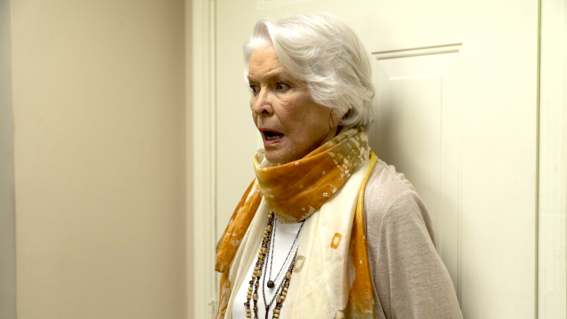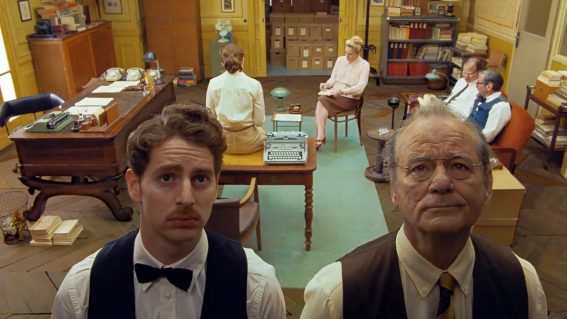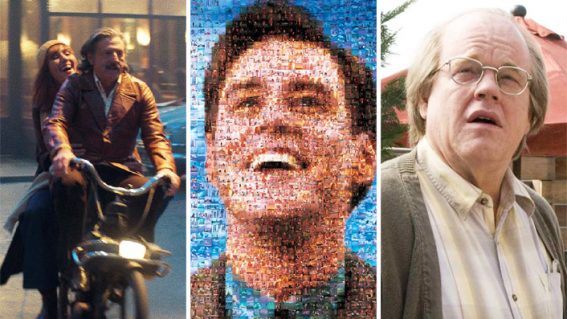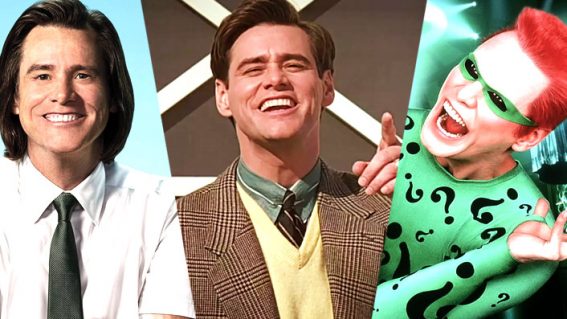The hugely entertaining Another Round is about control AND excessive day drinking

Four men embark on an experiment to constantly remain neither drunk nor sober in Another Round, a very sharp, smart and funny Danish comedy/drama. Here’s Luke Buckmaster’s review.
I’m not an alcoholic—I’m just participating in a science experiment. Anyone partial to a tipple or three or floor and are interested in trying out that line ought to watch director Thomas Vinterberg’s strangely elegant and very entertaining drama and black comedy, Another Round, then either slam down some shots or stay dry. The genius of this film is that it directs you to neither position.
A group of school teachers—including protagonist Martin (Mads Mikkelsen)—embark on a pseudoscientific experiment whereby they attempt to constantly remain neither sober nor drunk. To be precise: to always have a 0.5% blood alcohol reading. They are inspired by an idea from Norwegian psychiatrist, Olympics committee member and hero of alcoholics everywhere, Finn Skarderud, who argued that humans are born with a blood/alcohol deficiency. This leads to situations that are fun, and sad, and kind of tragic, and kind of lovely, and occasionally flat-out pathetic.

Their research project is not—shall we say—peer reviewed. But when the group decide they’re in, Nikolaj (Magnus Millang) does reach for the keyboard and bang out words such as “verbal motor and psycho-rhetorical effects”—for an extra whiff of pretend credibility. Later, once they are well into it, he suggests a change of focus to contemplate the “entire spectrum” of booze. A fancy way of saying they should all get shitfaced.
By the time the initial idea is floated, during a dinner at a nice restaurant, Vinterberg and co-screenwriter Tobias Lindholm have already established that Martin is experiencing what tends to be lumped into the category of “mid-life crisis”. He’s bored by his job and he and his wife Anika (Maria Bonnevie) are distant in a way only people who’ve shared lots of time together can be: that air of tense familiarization; the strong inference of love lost or neglected.
Martin is quiet during most of that dinner conversation. For a while you can’t quite ascertain whether his big heavy eyes are welling with tears, or just sort of glistening in a grief-stricken way. Mikkelsen’s fascinating face reminds me of Edvard Munch’s painting The Scream: a face that that seems to dribble—just a bit—towards the floor; a face that seems—just a bit—to collapse into itself; a face that seems—just a bit—not entirely made of this world. A face that reflects humanity through its potential absence.
The point is made—through very fine acting and writing—that this man is ready for a seachange. Another point, important to the premise, is also simultaneously made: that reasonably modest alcohol consumption boosts behaviour in many ways, making people more sociable, more confident, more loquacious. With, shall we say, a potential reduction in behavioural etiquette from time to time if too much is consumed—a la collapsing on the ground and walking into walls.
Another Round‘s opening scene shows rambunctious youngsters binge drinking by the side of a river, canvassing nuances of their approach to partying that may at a push be considered harsh but fair—such as no vomiting allowed. Lindholm frames the film with these images, but it’s not clear what his value judgement is or even if he has one.
This mystery is prevalent throughout; the freshness of the film’s perspective and its very intelligent treatment doesn’t make it clear where the messages will land. The ‘meaning’ or lackthereof is teased from the start, treated as a sort of philosophical reveal, imbuing the drama with a bubbly intellectual energy. Characters and situations are pushed to the fore through unobtrusive camerawork and an overarching style that doesn’t call attention to itself.
The screen intermittently turns to black to show the characters’ blood alcohol level: a visual reminder that the film we’re watching is about control. Day drinking, yes, and excessive drinking, but also control. Understanding the nature of control in the context of something like alcohol brings to mind Hunter S. Thompson’s famous thoughts about the edge—i.e. that the only people who really know where it is are those who have gone over.

It would be easy to configure another film about alcohol as a stepping stone to oblivion. Film history is sprinkled with interesting, psychologically intense representations of that journey, matching snozzled mindsets with atmospheric fervour—such as The Lost Weekend and Wake in Fright. Many other films revolve around self-destructive bottle-clutching characters, of course, with far too many to list, but here’s a few recommendations that wobble around in my memory: Under the Volcano, Leaving Las Vegas, Barfly and the under-rated Flight.
But boy we’ve seen and heard it before: the trembling hands; the literal or symbolic fall into the gutter; the AA meetings; the voice of the director screaming “shame!”. Another Round doesn’t do that—but nor does is put alcohol on a pedestal. There is a moment when a man, blotto, urinates in the bed he is sharing with his wife, which is obviously pathetic. There is also a moment when a student conquers his nervousness by wolfing down just the right amount of hard liquor to give him a confidence boost before an exam.
A simple way of describing Vinterberg’s perspective is that, like most things in life, booze can be used wisely or foolishly. It can be fun; it can be tragic; it can be associated with the entire gamut of human emotions. It apparently also involves something called psycho-rhetorical effects.
















